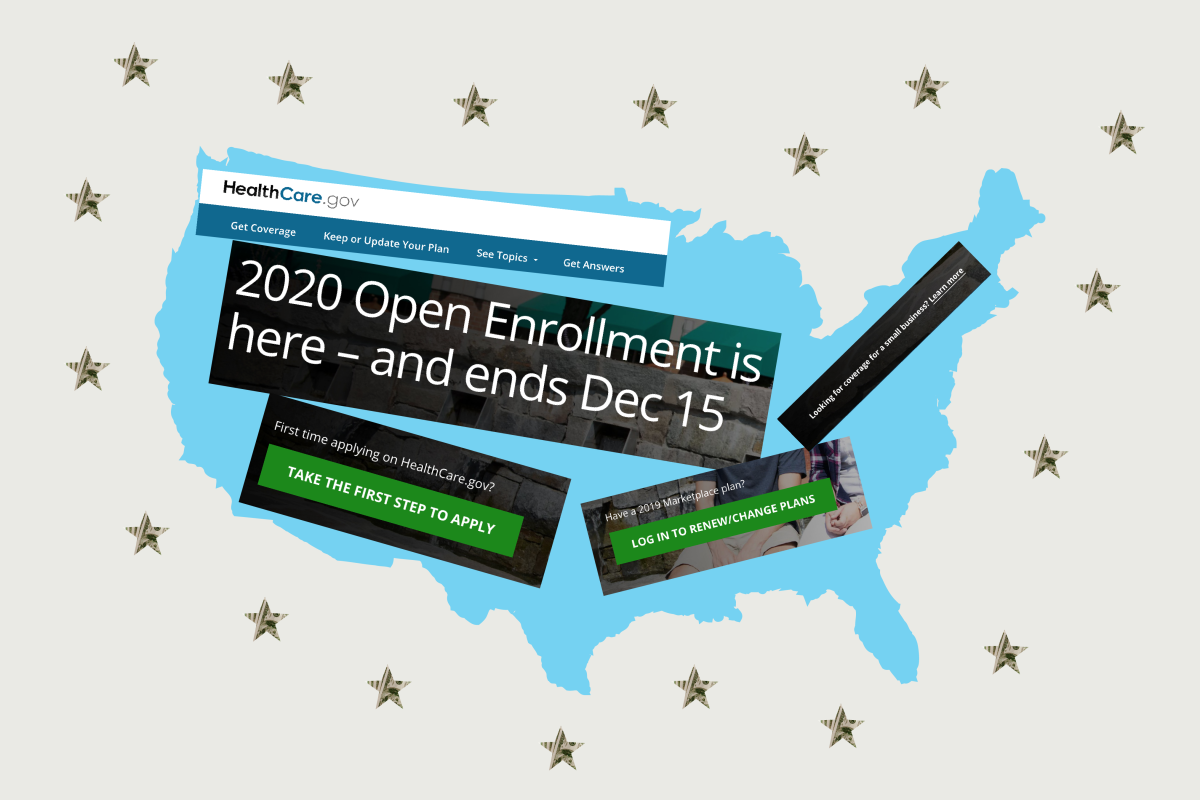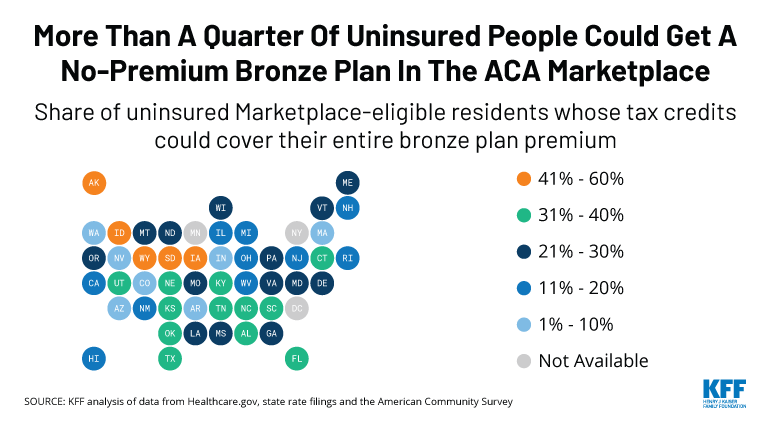4.7 Million Uninsured People Nationally Could Get a No-Premium Bronze Plan in the ACA Marketplace, Though Deductibles Would be High
Analysis: 
Half Live in Four Large States: Texas, Florida, North Carolina and Georgia
As the Affordable Care Act’s open enrollment period nears an end in most areas this week, a new KFF analysis finds that 4.7 million currently uninsured people could get a bronze-level plan for 2020 and pay nothing in premiums after factoring in tax credits, though the deductibles would be high.
That works out to 28 percent of the 16.7 million uninsured individuals who are potential customers for coverage through ACA marketplaces.
Half of the uninsured who could get a free bronze plan live in one of four large states: Texas (1,151,300 people), Florida (694,800), North Carolina (338,200) and Georgia (303,600). The analysis has detailed data on the number and share of the uninsured in each state who have access to a free bronze plan.
Iowa by far has the largest share (59%) of potential marketplace customers who could enroll in a bronze plan without having to pay a premium. This reflects a combination of factors, including the state’s relatively high premiums for its benchmark silver plan that results in larger tax credits for low- and moderate-income residents.
Other states with large shares of uninsured residents who could sign up for a no-premium bronze plan include Alaska (45%), Wyoming (44%), Idaho (41%), South Dakota (41%), North Carolina (40%), Oklahoma (40%) and South Carolina (40%).

A bronze plan could provide the uninsured with access to some primary care, no-cost preventive services, and financial protection against high health costs, though they come with very high annual deductibles ($6,506 on average in 2020).
Consumers may want to consider paying a premium for a silver plan instead so that they can benefit from cost-sharing subsidies available under the ACA. The ACA’s cost-sharing subsidies are available to people with incomes below 250% of the federal poverty level who sign up for a silver plan, resulting in deductibles ranging from $209 to $3,268 depending on income level.
In most states, potential customers have until Sunday, Dec. 15 to sign up for a marketplace plan, though a few states that run their own marketplaces have extended open enrollment periods. KFF’s Health Insurance Marketplace Calculator allows users to enter their income, age, and family size and get estimates of premiums and available subsidies for insurance purchased on the ACA exchanges. In addition, KFF has updated its searchable online collection of 300 frequently asked questions about the health insurance marketplace, tax credits and other open-enrollment consumer issues.
Filling the need for trusted information on national health issues, the Kaiser Family Foundation is a nonprofit organization based in San Francisco, California.
More Articles
- Department of Labor Awards $5M to Train, Expand Pathways for Women for Registered Apprenticeships, Nontraditional Occupations
- Julia Sneden Wrote: Going Forth On the Fourth After Strict Blackout Conditions and Requisitioned Gunpowder Had Been the Law
- Voting Rights: Assistant Attorney General Kristen Clarke Testifies Before the Senate Judiciary Committee Hearing; “One of the most monumental laws in the entire history of American freedom”
- Consumer Financial Protection Bureau (CFPB): Lenders Cannot Discriminate Based on Sexual Orientation or Gender Identity
- Kaiser Family Foundation (KFF), February 8th: This Early Stage of the COVID-19 Vaccine Roll-Out, Most Older Adults Have Not Yet Been Vaccinated As Supply Remains Limited
- How are States Prioritizing Who Will Get the COVID-19 Vaccine First? CDC’s Advisory Committee on Immunization Practices (ACIP) Released an Interim Recommendation For the Highest Priority Group
- Updated Subsidy Calculator and 300+ FAQs Help Consumers Understand the ACA Marketplaces as Open Enrollment Begins
- Kaiser Health Foundation: Distributing a COVID-19 Vaccine Across the U.S. - A Look at Key Issues
- Scientific American Endorses Joe Biden We’ve never backed a presidential candidate in our 175-year history — until now
- Stateline: Many Faithful Say It’s Time to Gather. Some Governors Disagree






